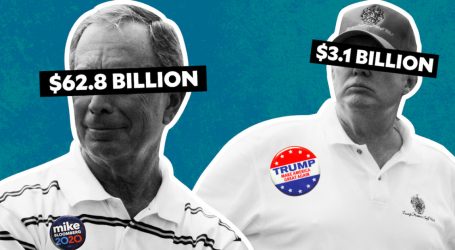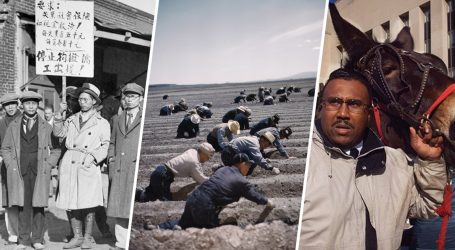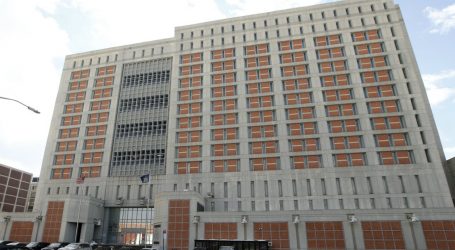Trump town hall on ‘core black issues’ with Sean Hannity is so absurd it hurts
Donald Trump will tape a ‘town hall’-style event at a black church in Ohio Wednesday morning to discuss “core issues and concerns surrounding African-Americans.”
The event will take place at pastor and black Trump surrogate Darrell Scott’s Cleveland-area church, the New Spirit Revival Center. Sean Hannity will ‘moderate’ the discussion, which will air on Fox News tonight in primetime.
This ‘meeting’ comes on the heels of Donald Trump’s ‘birther’ concession; a moment when, after five years of peddling the conspiracy that President Obama wasn’t born in America, Trump stood before a crowd in Washington and half-heartedly admitted that he lied.
In a brief, matter-of-fact delivery, Trump attempted to make himself more palatable to black voters, many of whom view the birther movement as a racist attempt to undermine the legitimacy of the country’s first black president.
It was this important, yet underwhelming, moment that was supposed to signal Trump’s big pivot towards luring in black voters – a demographic that he’s consistently struggled with. However, it’s unlikely that the confession will result in the surge the Republican candidate hopes for.
So as the circus that is the Trump campaign makes a stop in Cleveland, what, exactly, could Donald Trump hope to possibly communicate during this interview with Hannity? After all, his rise to political prominence came as a result of overtly racist talking points and “Alt-right” fervor. His arena-filling rallies over the past year have been little more than public gathering spaces for white supremacists and hotbeds of violence against protesters.
Should, then, Donald Trump’s last-ditch effort be enough to convince black voters that he is the candidate best able to address “African-American concerns?”
Hardly.
His track-record suggests not, and he can’t wheel out enough black faces to convince me otherwise. Simply put, the Trump campaign’s recent push to secure black votes is absurd.
His Past Predicts His Future
Speaking last month to a predominantly white crowd in Dimondale, Michigan, Donald Trump boldly asked “What the hell do you have to lose,” going on to use inaccurate statistics to paint a dystopian portrait of black America. The question posed was odd for a few reasons.
First, because the audience present was mostly all white, and the question itself was directed towards black voters. More odd, though, was the fact that the person asking the question seemed to ignore his own past of discrimination; the very type of discriminatory views that helped create the environment he now criticizes.
In 1973 while Donald Trump served as the president of his father’s real estate company, the Trump Management Corporation, the Department of Justice sued the company for violating the Fair Housing Act, alleging racial discrimination against potential black renters in several of the Trumps’ buildings. While Donald and his father ultimately settled the lawsuit without having to admit guilt, the suit alleged that the Trumps quoted different rental conditions and terms to black renters seeking housing than to white renters and lied to black rental candidates about apartments not being available. In fact, just a few short years later, the Justice Department sued the Trump company again for the same reason.
Recognizing that, it’s hard to believe Donald Trump when he now says that he’s concerned with issues facing black Americans. The disparities in education and employment that exist now are a result of the same racist attitudes Donald Trump helped perpetuate.
While Trump was allegedly keeping black tenants out of his buildings, an employer a few blocks away was likely denying an applicant because of the color of his skin. Both worked in concert to create inner-city communities with few economic opportunities, and crumbling, underfunded schools for black children. Trump, more than most, has played a direct role in preserving the structure of white supremacy. Even if his data is a bit off (things aren’t as bad as he makes them seem), Donald Trump is objectively one of the many architects of a system that has worked to disadvantage black people for many years.
And he’s done a poor job during his campaign to change my perception.
Trotting out black preachers in order to ingratiate himself with black Americans has hardly worked to refurbish his image. Not because of their religious affiliation but because they have been so willing to lie about the most basic things.
Earlier this month, top Trump surrogate Mark Burns admitted to fabricating several of his biographical claims. In an interview with CNN’s Victor Blackwell, Burns confessed that he was never in the Army Reserve, that he actually didn’t finish college and that he was never a member of the Kappa Alpha Psi fraternity.
His head of black outreach, Omarosa Manigualt, has remained mind-numbingly quiet about Trump’s offensive remarks, policy proposals and campaign strategy.
Pastor Scott, the host of the town hall event this evening, consistently stumbles on TV just to justify his chosen candidate’s experience and background. Most notably, he claimed that Donald Trump saved the auto industry, despite the fact that in 2008, the year that the bailout occurred, Trump was a Clinton supporter and a reality star.
No, nothing Donald Trump does at this point could convince me that he’s the candidate that’s better suited to handle issues that matter to African-Americans. Not his personal history – which is blotched with racial prejudice; and certainly not the campaign he’s run: one that has been fueled by fear, violence, and mounting lies.
His recent efforts to secure black voters come as a result of desperation and not of genuine concern.
Brian C. Bush is a writer with an interest in race, gender, culture and the law. He can be reached on Twitter @BrianCB




